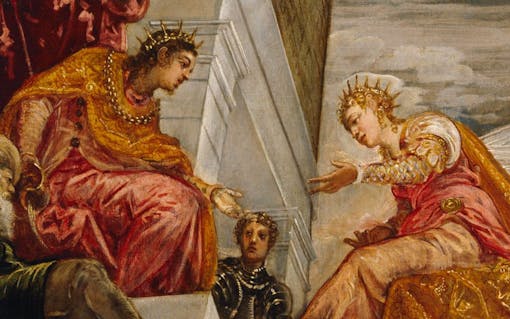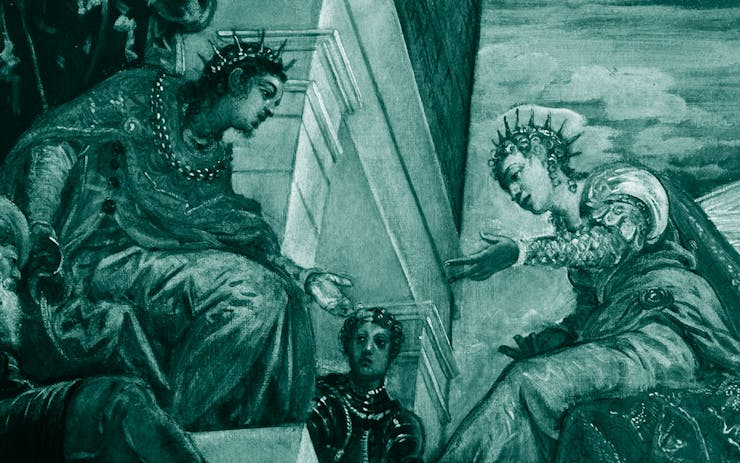Many women today use cannabis medically, and many more just love a good high, which in ancient times was one and the same says Ellen Komp, author of Tokin’ Women: A 4000-Year Herstory of Women and Marijuana and deputy director of cannabis advocacy group, California NORML. “What has come down in recorded history as healing was done in a more ritualistic fashion, tied to spiritual practices where a shaman or shamaness partook of the cannabis or dispensed it to her patients.”
While history has often left women’s stories out, surviving legends of some goddesses and influential women reveal cannabis as central to their powers—at least in theory. Here are some of the biggest names that have carried over maps and millennia:
Ancient Near East: Goddess Ishtar (2300 BCE, likely earlier)

Ancient Akkadian cylinder seal depicting Inanna resting her foot on the back of a lion while Ninshubur stands in front of her paying obeisance, c. 2334 – c. 2154 BC (Public Domain)
Tributes to this “Queen of Heaven” and goddess of healing were widespread across the region, with a dedicated herb called Sim.Ishara burned in her honour.
For thousands of years the goddess Ishtar (also Innana and Astarte) held spiritual rule over Mesopotamia, the land that gave rise to powerful empires such as Akkadia, Babylon, and Assyria, and that roughly makes up modern-day Iraq, Kuwait, and parts of Syria, Iran, and Turkey.
Also worshipped in ancient Egypt, tributes to this “Queen of Heaven” and goddess of healing were widespread across the region, with a dedicated herb called Sim.Ishara burned in her honour. Sim. Ishara translates as “aromatic of the Goddess Ishtar”, which Assyriologist Dr. Erica Reiner has stated is the same plant as the Akkadian herb “qunnabu”, or cannabis.
As war and battle (and patriarchy) intensified across the region, Ishtar evolved from compassionate healer into the goddess of war, becoming the representative lover of the ruling king. Komp says this cultural shift “sexualized goddesses [and holy women] as it stripped them of their powers to heal. One of those powers was knowledge of plants like cannabis. Later, the witch burnings did the same.”
A likely precursor to the Greek Aphrodite, among others, Ishtar was also the centre of an ancient Babylonian spring solstice event celebrated with flowers, painted eggs, and rabbits—much like the German goddess “Ostara”, and modern-day “Easter”. (So go ahead and enjoy some cannabis-infused Easter eggs, in the name of Ishtar.)
Southern Arabia/North Africa: Queen of Sheba (950 BCE

The Queen of Sheba’s visit to Solomon by Tintoretto, around 1555 (Public Domain)
“We don’t know if she is mythical or real,” says Komp of the legendary Queen of Sheba, recorded as bringing a trove of gold and spices to the Israelite King Solomon. “The spices she brought are not named, but cannabis was traded in her time along trade routes she may have used.”
Shop highly rated dispensaries near you
Showing you dispensaries nearThe Queen of Sheba is first mentioned in the Old Testament, then the Aramaic Targum Sheni, the Quran (where she is called Bilqis), and the Ethiopian foundational story, Kebra Nagast. Her kingdom of Saba, either modern-day Yemen or Ethiopia, amassed impressive wealth through control of trade routes. While her legend grew more fantastical with every iteration—including having the legs of a donkey—the common thread is her journey north to pay tribute to the newly powerful King Solomon.
In The Testament of Solomon (written circa 100-300 CE), Komp says there is mention of a woman named Onoskelis—meaning donkey-legged woman—who was close to King Solomon and helped him construct the temple of Jerusalem with hempen ropes. The Ethiopian legend says the Queen of Sheba came home pregnant with Solomon’s son, calling her the founding mother of their Solomic Dynasty, spanning three thousand years until 1975.
Ancient Israel: Goddess Asherah (circa 1800 BCE)

Image on pithos sherd found at Kuntillet Ajrud below the inscription “Yahweh and his Asherah” (Public Domain)
Sometimes considered mother to Ishtar, consort to gods El and Baal, or wife of Yahweh (later edited out of the Bible), goddess Asherah/Athirat is associated with the Tree of Life, “bearing the forbidden fruit that allows men to think like gods” writes Komp. Tributes to Asherah were cult objects of sacred poles, or stylized trees, erected by Israelites throughout most of their history and mentioned over thirty times in the Hebrew Bible. Even King Solomon had built an entire temple to Asherah, later torn down by King Josiah.
The identity of the Tree of Life is one of mankind’s greatest mysteries. Why was only one plant forbidden?
“An ancient depiction of an Asherah tree from the palace of Ashurbanipal looks a lot like a cannabis plant with a top cola,” says Komp, noting the tree’s leaves were inscribed with seven and nine points. Israelites were eventually forbidden to pay tribute to Asherah, but many kept erecting sacred poles/trees in her honour anyway. Much later, in medieval times, Komp notes some Islamic writers identified cannabis by the name asherah. She continues: “The identity of the Tree of Life is one of mankind’s greatest mysteries. Why was only one plant forbidden?”
Siberia: Princess Ukok (a.k.a. the Siberian Ice Princess, 1500 BCE)
Preserved by permafrost in the Altai Mountains, the mummified remains of an ornately tattooed young woman were found in 1993 by Dr. Natalia Polosmak. Discovered along with six saddled and bridled horses (possibly her spiritual escorts), Princess Ukok was entombed with ornaments of bronze, gold, plus a small container of cannabis. Because of her tattoos, Komp says the ‘princess’ was more likely a high priestess of the Pazyryk people, a tribe closely related to the nomadic Scythians known for their ritualistic cannabis use.
“Healing and spiritual practices were more connected in the past,” she says, referring to MRI evidence that the princess had cancer and possibly used cannabis medically. In addition, she says the tall, elaborate headgear found with the woman’s remains is thought to represent the Tree of Life. (see Asherah, above).
“Many more grave sites in the region are being found with hemp present that are now being identified as women, thanks to DNA testing,” says Komp.
China: Magu, Hemp Maiden (300 CE, or earlier)

(Public Domain)
“Some think she was real,” says Komp of the Taoist xian Magu, whose name roughly means “hemp maiden”. While folktales vary, Magu is said to have been a kind young woman who ascended to immortality at Magu Shan, or Magu Mountain, of which there are two in China.
Though hemp has been cultivated in the region since Neolithic times, most of its use was for industrial purposes—save for the Taoists who hold Magu in high esteem. Komp cites 20th century scholar Joseph Needham, who described Magu as presiding over Shandong’s sacred Mount Tai, where cannabis was gathered on the seventh day of the seventh lunar month. He also wrote: “There is much reason for thinking that the ancient Taoists experimented systematically with hallucinogenic smokes.” Plus, a Daoist encyclopedia from about 570 BCE records cannabis added to ritual incense burners, or censers. Also known as the goddess Mago in Korea and Mako in Japan, many folktales say “Magu scratches the itch”.





